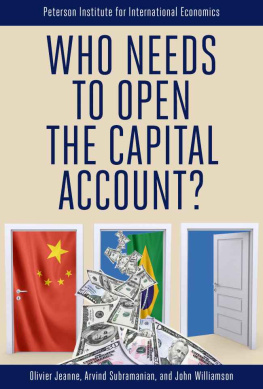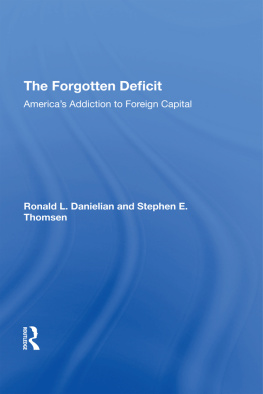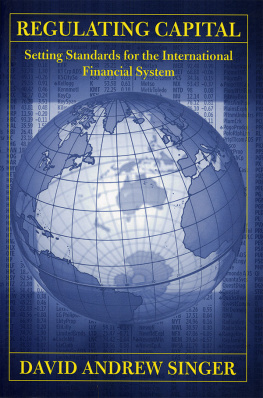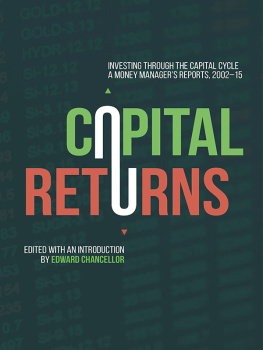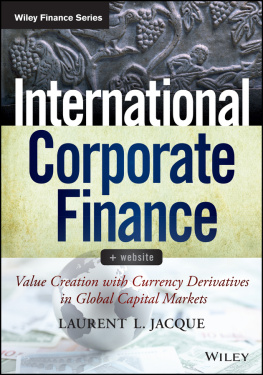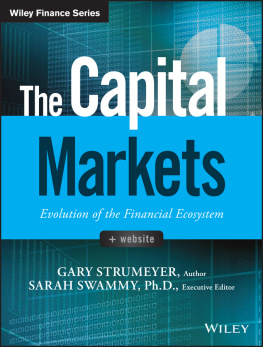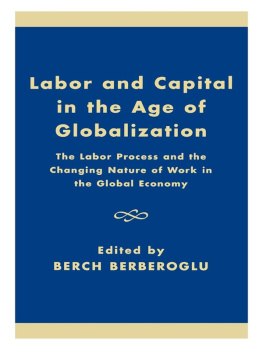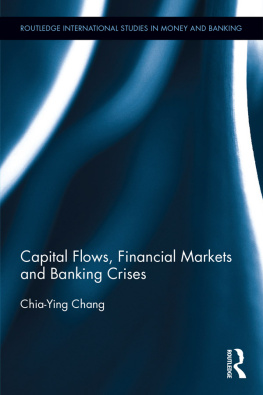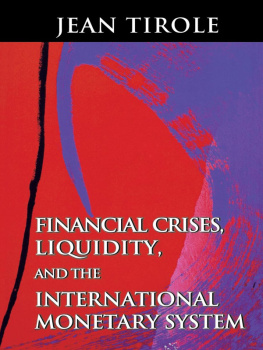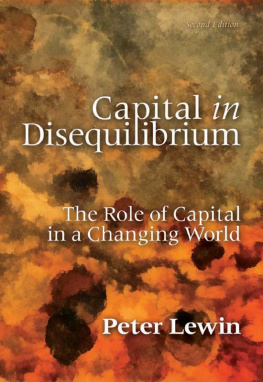

Olivier Jeanne has been senior fellow at the Peterson Institute for International Economics since 2008. He is a professor of economics at the Johns Hopkins University and has taught at the University of California Berkeley (1997) and Princeton University (200506). He is a research affiliate at the National Bureau of Economic Research (NBER), Cambridge, MA, and a research fellow at the Center for Economic Policy Research, London. From 1998 to 2008 he held various positions in the Research Department of the International Monetary Fund. He has served on the editorial boards of several journals, including the Journal of International Economics and International Journal of Central Banking .
Arvind Subramanian is senior fellow jointly at the Peterson Institute for International Economics and the Center for Global Development. He is the author of Eclipse: Living in the Shadow of Chinas Economic Dominance (2011). Foreign Policy magazine named him as one of the worlds top 100 global thinkers in 2011. He was assistant director in the Research Department of the International Monetary Fund, served at the GATT (198892) during the Uruguay Round of trade negotiations, and taught at Harvard Universitys Kennedy School of Government (19992000) and at Johns Hopkins School for Advanced International Studies (200810). He advises the Indian government in different capacities, including as a member of the Finance Ministers Expert Group on the G-20.
John Williamson , senior fellow, has been associated with the Institute since 1981. He was project director for the UN High-Level Panel on Financing for Development (the Zedillo Report) in 2001; on leave as chief economist for South Asia at the World Bank during 199699; economics professor at Pontifcia Universidade Catlica do Rio de Janeiro (197881), University of Warwick (197077), Massachusetts Institute of Technology (1967, 1980), University of York (196368), and Princeton University (196263); adviser to the International Monetary Fund (197274); and economic consultant to the UK Treasury (196870). He is author, coauthor, editor, or coeditor of numerous studies on international monetary and development issues, including Reference Rates and the International Monetary System (2007), and Curbing the Boom-Bust Cycle: Stabilizing Capital Flows to Emerging Markets (2005).
PETER G. PETERSON INSTITUTE FOR INTERNATIONAL ECONOMICS
1750 Massachusetts Avenue, NW
Washington, DC 20036-1903
(202) 328-9000 FAX: (202) 659-3225
www.piie.com
C. Fred Bergsten, Director
Edward A. Tureen, Director of Publications,
Marketing, and Web Development
Typesetting by Susann Luetjen
Printing by Versa Press, Inc.
Cover design by Peggy Archambault
Cover photos: Fotolia
Copyright 2012 by the Peter G. Peterson Institute for International Economics. All rights reserved. No part of this book may be reproduced or utilized in any form or by any means, electronic or mechanical, including photocopying, recording, or by information storage or retrieval system, without permission from the Institute.
For reprints/permission to photocopy please contact the APS customer service department at
Printed in the United States of America
14 13 12 5 4 3 2 1
Library of Congress Cataloging-in-Publication Data
Jeanne, Olivier.
Who needs to open the capital account / [Olivier Jeanne, Arvind Subramanian, John Williamson].
p. cm.
Includes bibliographical references and index.
ISBN 978-0-88132-511-9
1. Capital movements. 2. Capital. 3. CapitalAccounting. 4. Investments, Foreign. I. Subramanian, Arvind. II. Williamson, John, 1937III. Title.
HG3891.J43 2012
332.0424dc23
2012003377
The views expressed in this publication are those of the authors. This publication is part of the overall program of the Institute, as endorsed by its Board of Directors, but does not necessarily reflect the views of individual members of the Board or the Advisory Committee.
Jacques J. Polak
19142010
This volume is dedicated to the memory of Jacques Polak, one of the last surviving participants in the Bretton Woods conference and a former Research Director and Economic Counselor at the International Monetary Fund. He was a member of the Advisory Committee of the Peterson Institute for International Economics from 1985 to 2004 and advised our publication International Economic Insights for several years. He was perhaps best known for having invented the Polak model, which showed that, subject to certain specified conditions, a country with a fixed exchange rate would ultimately have a payments deficit equal to the size of domestic credit expansion, which subsequently became the basis for the standard IMF program. Jacques might not have endorsed everything in this volume but his abiding intellectual curiosity would surely have demanded that he understand the argument.
Contents
Tables
Figures
Box
Preface
Although economists generally agree that countries can derive substantial gains from international economic integration, the extent to which they should open themselves to international capital flows remains a controversial issue. The Peterson Institutes research and publications over the years have reflected the diversity of views on the benefits of globalization, but never by following the fashion of the day. In his book Has Globalization Gone Too Far? (1997) Dani Rodrik presented a skeptical view of globalization at a time (before the Southeast Asian crisis) of widespread optimism about the benefits of capital flows to emerging-market and developing economies. More recently, William Clines Financial Globalization, Economic Growth, and the Crisis of 200709 (2010) reaffirms that financial globalization represents a significant factor in economic growth of emerging-market economies, at a time when many have second thoughts about the benefits of financial liberalization.
In this book, Senior Fellows Olivier Jeanne, Arvind Subramanian, and John Williamson revisit the question of how developing and emerging-market economies should integrate into global financial markets. There is still, 20 years after the rise of emerging-market finance, a wide diversity of approaches to capital account policies. Some emerging-market economies maintain a completely open capital account. Others, most notably Brazil, have experimented more actively with market-based prudential capital controls since the crisis. And still other countries, such as China, maintain tight restrictions on their capital accounts.
Jeanne, Subramanian, and Williamson argue that this diversity of policies is consistent with the lack of strong evidence for or against the benefits of capital account liberalization. They showusing a meta-regression approach incorporating a large number of empirical specificationsthat free capital mobility seems to have little impact on economic development (although there is some evidence that foreign direct investment and stock market liberalization may, at least temporarily, raise growth). Furthermore, economists now understand better the welfare benefits of prudential capital controls of the type that Brazil is using to curb the boom-bust cycle in capital flows. The question of capital controls is a technical, not an ideological, one: Some controls may be appropriate under certain circumstances, whereas others may be harmful. Accordingly, there is no rationale for the international community to promote totally free trade in assetseven over the long run.
This being said, Jeanne, Subramanian, and Williamson find the status quoin which there is no international rule or discipline for capital account policiesproblematic. On the one hand, the lack of commonly agreed rules implies that capital controls are still marked by a certain stigma, so that the appropriate policies may be pursued with less than optimal vigor. On the other hand, certain capital account policies may have harmful multilateral effects and negative spillovers on the global economy. This is particularly the case of policies that repress domestic demand and, through a combination of reserve accumulation and restrictions on inflows, maintain a current account surplus. Those policies have the same economic effects as trade protectionism and undermine the global public good that is free trade. Thus, Jeanne, Subramanian, and Williamson see a need for an international regime that would legitimize the use of capital account policies that are appropriate and discourage the use of those that are not.
Next page
